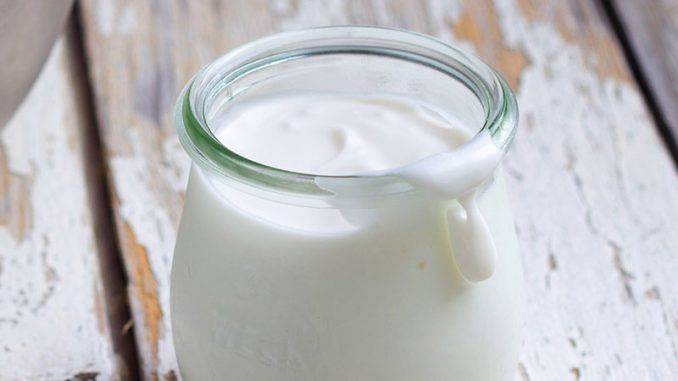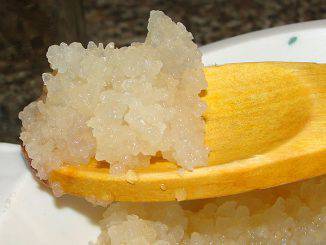
Undoubtedly, Kefir is the dairy product containing the largest number of probiotic bacteria and yeasts. Its probiotic features are numerous and unmatched by any other probiotic food.
Furthermore, from ancient times Kefir has been perceived as a natural drug, able to relieve or cure a large variety of illnesses and disorders.
As a dairy product, just like natural milk, milk Kefir is, first of all, a great source of protein and calcium.
However, it has the added benefits of being a probiotic. Probiotics are actually those friendly bacteria that colonize the gut and are extremely beneficial for the entire digestive system.
Yogurt may be the most famous product with probiotic properties, but Kefir actually has a much more powerful probiotic effect. One of the features that distinguish Kefir from other fermented dairy products is the presence in the fermentation process of Kefir grains containing a much larger range of probiotic bacteria and yeasts than any other fermented dairy product.
These Kefir grains are microbially derived protein and polysaccharide matrices containing a community of bacterial and fungal species that lie in the base of Kefir fermentation.
There are several methods for Kefir production, and commonly both traditional and industrial processes are used.
Unlike traditional methods, commercial and industrial-scale production rarely utilizes Kefir grains for fermentation. These methods normally use starter cultures of microorganisms that have been isolated from Kefir or Kefir grains to provide a more consistent product. In both cases, however, the probiotic content of Kefir and its numerous health benefits are fairly similar.
Many health-promoting effects have been attributed to Kefir, including tumor suppression and prevention, gastrointestinal immunity and allergy control, wound-healing properties, cholesterol assimilation, ACE inhibition, and numerous antimicrobial effects, but the first and the foremost power of Kefir is its ability to balance and harmonize the composition and activity of the gut microbiota.
After the fermentation process, the resulting Kefir drink contains over 50 different beneficial bacteria and yeast strains. Other fermented dairy products contain far fewer beneficial bacteria, and they usually do not contain any yeast.
The health benefits of Kefir are, however, not just linked to digestion. They actually influence other parts of your organism, including your immune system, heart, and skin, and may affect all inflammatory processes within the body.

Kefir is the most potent source of probiotics
The main way probiotics of Kefir can provide health-related benefits is by optimizing the gastrointestinal system, which usually directly affects the overall immune system of humans.
It is well known that the normal functioning of almost all our body systems depends on the right bacterial balance in our gastrointestinal tract. This balance between the pathogenic and the “good” bacteria in our gust largely depends on the presence of beneficial bacteria strains, predominantly of the lactic acid bacteria (LAB) type.
Kefir is considered an exclusive example of a microbial colony manifesting strong resistance against many pathogenic microorganisms, thus improving natural immunity in all mammals, including humans.
Many probiotic products have been found to contain various numbers of lactic acid bacteria. Still, the microbiological and chemical compositions of Kefir show that it is one of the most complex probiotic structures containing the largest number of lactic acid bacteria strains that ever existed.
Main health benefits of Kefir
Improves digestion and relieves constipation.
In most cases, Kefir improves digestion due to its probiotic content. Probiotics help restore balance in the gut, thereby improving digestion.
The most important part of Kefir’s probiotic effects is that its microorganisms actually “colonize” the intestines and bower and stay there much longer than with yogurt.
Those with a diagnosed condition such as inflammatory bowel disease (IBD) or irritable bowel syndrome (IBS) should still consult their physician or dietitian before introducing fermented foods because, in most cases, Kefir appears to improve the condition and alleviate its symptoms.
Powerful immune system modulator.
The immune system is vitally important – it protects our body from infections (bacteria, viruses, fungi, etc.), as well as tumor cells and foreign genetic information.
In their desire to protect themselves from infectious diseases, many people want to “strengthen” it without actually knowing how the body actually protects itself from infections.
The immune system of a healthy person should rather be BALANCED than strong.
This means that it should respond strongly enough to eliminate the infection when pathogens enter our body, but still without harming the body itself since the immune system’s overreactions are the base of a large list of severe health conditions known as “autoimmune diseases“.
Therefore, it is important to keep our immune system balanced, and this balance is directly connected to our body’s microbiome and our gut’s microflora.
This is precisely the place where Kefir comes to the rescue by achieving the right balance of microorganisms in our guts that results in an effective and balanced immune system.
Powerful antibacterial properties.
Some of the probiotic lactic acid bacteria found in Kefir also have confirmed antibacterial activity. This includes Lactobacillus kefiri, which is found only in Kefir, but most of the other Kefir bacteria also have various antibacterial effects.
This antibacterial effect against many pathogenic organisms is due to the inherent development in Kefir of organic acids, hydrogen peroxide, acetaldehyde, carbon dioxide, and bacteriocins.
Studies show that some yeasts found in Kefir can inhibit the growth of certain well-known pathogenic bacteria, such as Salmonella and Escherichia coli.
Microorganisms contained in the fermented products are also proven to have an anti-Helicobacter pylori effect. Studies revealed that the consumption of probiotics in yogurt and Kefir substantially improves the effects of Helicobacter pylori infection treatment and directly inhibits the development of pathogenic bacteria.
Kefir can also prevent the overgrowth of a bacterium from the group B Beta Streptococcus, a harmful bacteria that can cause severe infections such as sepsis, pneumonia, and meningitis.
Kefir has been tested in experiments against a wide range of pathogenic bacterial and fungal species and found to have antimicrobial activity similar to antibiotics like ampicillin, azithromycin, and amoxicillin, but still without the side effects antibiotics have.
Improves bone strength.
As Kefir is made from cow’s milk, it contains large quantities of calcium and vitamin K, nutrients that are important for bone health.
Kefir can improve bone strength and reduce the risk of osteoporosis. Kefir increases the absorption of calcium by bone cells through its calcium and vitamin K2 content that plays an important role in calcium metabolism, which may reduce the risk of fractures by up to 80%.
As we grow older, our bones become weaker, with an inherent risk of osteoporosis and fractures, especially in post-menopausal women.
Along with other dairy products, Kefir is a useful source of calcium that may solve these problems. Kefir may therefore be very beneficial for elderly people.
Controls cholesterol levels and blood pressure
Kefir contains Kefiran, a polysaccharide associated with lower blood pressure and cholesterol in studies. It also contains vitamin B and Tryptophan, which reduce stress and produce a calming effect.
Although the evidence that Kefir consumption reduces serum cholesterol is still limited, some research results have found a decrease in total serum cholesterol and phospholipids in mice fed with high cholesterol foods supplemented with Kefir.
Anti-carcinogenic effects.
Probiotics of fermented dairy products are believed to suppress tumor growth by reducing the formation of carcinogenic compounds and stimulating and balancing the immune system.
Although no conclusive studies have yet proven the direct anti-carcinogenic effect of Kefir on humans, several studies analyzed the effects of Kefir on the growth of tumors in mice.
Both soy milk Kefir and cows’ milk Kefir were found to inhibit tumor growth by 64 to 70%, compared with mice in the control group.
In addition, Kefir extracts have been shown to suppress the growth of breast cancer cells in vitro. Some of these anti-carcinogenic abilities of Kefir have been associated with the exopolysaccharide Kefiran. In this mouse study, Kefiran was shown to inhibit cancer cell growth by stimulating the host immune system rather than acting directly on the cancerous cells.
In other studies on fusiform cell sarcomas, mice receiving intraperitoneal Kefir had reduced tumor size, with some tumors completely disappearing over a 20 days treatment period.
In humans, the anticarcinogenic role of Kefir and other fermented dairy products can be attributed to cancer prevention and the suppression of early-stage tumors or by strengthening the immune system.
High levels of acetic acid and lactic acid found in Kefir also have antioxidant effects, which decrease the risk of DNA damage, which usually lies in the base of most malignant tumor growths.
Lactose-intolerant patients better accept Kefir.
Lactose maldigestion is the inability to completely digest lactose, the major milk sugar in milk of all mammals.
Lactose maldigestion affects 75% of adults in the world. It occurs most often due to a genetically programmed decrease in the activity of the intestinal enzyme called lactase after the age of 3 to 5 years. This condition is called lactose intolerance.
In fermented dairy products such as Kefir and yogurt, lactose is converted to lactic acid, which is why lactose remains in considerably lower concentrations than in regular raw milk. In addition, they contain enzymes that can additionally break down lactose. This is why Kefir is generally better tolerated by people with lactose intolerance than regular milk.
In addition, Kefir can be made completely lactose-free by using coconut milk, soy milk, or other non-dairy products while preserving its probiotic features.
Inhibits the symptoms of allergies and asthma.
Allergies are overreactions of the body to otherwise harmless structures or substances from the environment.
People with more sensitive immune systems are more prone to allergic reactions and diseases such as asthma. In some studies, Kefir has been shown to suppress most inflammatory responses associated with allergies and asthma.
Improves the appearance and health of the skin.
As a natural anti-oxidant, Kefir keeps the skin youthful and glowing. It is also known to prevent acne and psoriasis, and reduce wrinkles. So, having Kefir daily will keep you looking young, and this is the reason why lots of frequent Kefir users are known to have the so-called “Kefir skin“.
Kefir and even Kefir grains can also be used directly on the skin as an excellent cosmetic product. You can use it on the skin of the hands and face, as this will refresh it, smooth out wrinkles and slow down aging.
Kefir is also known to have an immediate soothing and relieving effect when directly applied to sunburnt skin.

Helps with weight control.
Obesity is often associated with an imbalance of intestinal bacteria and slow metabolism.
As long as one of the main features of Kefir is its ability to speed up and boost metabolism, numerous scientific sources suggest that it is also why Kefir and yogurt are almost always a part of any weight-loss diet.
Researches suggest that some types of lactobacilli found in Kefir, especially the lactic acid bacteria known as LAB, may be directly associated with weight loss.
Although more research seems to be needed to confirm the direct benefits of Kefir on weight reduction, initial research results are promising.
Helps us to stay fit.
One cup of milk Kefir contains:
- 10% of the recommended daily dose of vitamin A, 25% of vitamin D, 30% – of calcium, and 8 grams of fat
- Phosphorus, iron, magnesium, manganese, potassium, and copper.
- 20% of the daily dose of calcium.
- About 10 grams of protein, including all eight essential amino acids.
For this reason, many bodybuilders, fitness gurus, and people who actively train for perfect body shape like to add Kefir to their protein shakes.
Slows down the consequences of aging.
It is definitely no coincidence that the countries where Kefir is consumed the most, such as Tibet, Turkey, Mongolia, or Russia, also have the highest number of centenarians per capita.
Kefir is rich in antioxidants that help slow down the aging process by neutralizing the free radicals and reducing the damage caused to the body cells and tissues due to oxidation.
Consuming Kefir is known to strengthen immunity, reduce inflammation, increase calcium absorption and improve bone density, and all these symptoms are often associated with old age.
With their antioxidizing and immunomodulatory properties, probiotics in Kefir keep down the production of pro-inflammatory chemicals by the intestinal cells, thus leading to a healthy gut. And a healthy gut always translates into healthy and glowing skin, elimination of digestive problems, and overall better health for elderly people.
This is the reason why Kefir is usually called “The elixir of youth“.
Main strains of probiotic bacteria and yeast found in Kefir
|
LACTOBACILLI Lactobacillus brevis Lactobacillus cellobiosus Lactobacillus acidophilus Lactobacillus casei ssp.alactosus Lactobacillus casei ssp. rhamnosus Lactobacillus casei Lactobacillus helveticus ssp. lactis Lactobacillus delbrueckii ssp. lactis Lactobacillus delbrueckii ssp. bulgaricus Lactobacillus lactis Lactobacillus fructivorans Lactobacillus hilgardii Lactobacillus kefir Lactobacillus kefiranofaciens Lactobacillus kefirgranum Lactobacillus parakefir |
STREPTOCOCCI/LACTOCOCCI Lactocuccus lactis ssp. lactis Lactocuccus lactis var. diacetylactis Lactocuccus lactis ssp. cremoris Streptococcus salivarius ssp. thermophilus Streptococcus lactis Enterococcus durans Leuconostoc cremoris L. mesenteroides |
|
YEASTS Kluyveromyces lactis Kluyveromyces marxianus var. marxianus Kluyveromyces bulgaricus Kluyveromyces fragilis / marxianus Candida kefir Candida pseudotropicalis Saccharomyces ssp. Torulopsis holmii |
ACETOBACTER Acetobacters aceti Acetobacters rasens |



